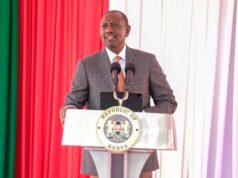
Consumers are currently facing a significant tax burden when purchasing fuel in Kenya, with taxes amounting to as much as Sh79 per liter. This taxation has a notable impact on driving up petroleum prices, leading to an estimated monthly revenue collection of Sh29.2 billion for the Kenya Revenue Authority (KRA) from the sales of diesel, petrol, and kerosene.
In the most recent price review, it was revealed that Sh79.31 is attributed to taxes and levies for every liter of petrol, followed closely by Sh67.35 per liter for diesel, which is the most widely used fuel in Kenya. Kerosene also incurs a substantial tax and levy component, amounting to Sh62.81 per liter.
This increased tax share will result in the KRA collecting approximately Sh5.79 billion more each month from these three fuel types compared to the Sh23.38 billion collected monthly since September of the previous year, prior to the doubling of the value-added tax (VAT) rate to 16 percent.
The growth in taxes and levies as a part of the fuel price is mainly attributed to the rising landed cost of petroleum products and the recent VAT increase. In a pricing review conducted until October 14 the previous year, taxes and levies were Sh64.14 per liter for super petrol, Sh53.39 per liter for diesel, and Sh46.81 per liter for kerosene.
In the latest price adjustment, diesel prices surged by Sh21.32 to reach Sh200.99 per liter in Nairobi, while super petrol increased by Sh13.96 to Sh211.64. Kerosene witnessed the most significant jump, rising by Sh33.13 per liter to Sh202.61, causing public outcry.
Despite public discontent and concerns about the impact on the cost of living, President William Ruto has defended the government’s taxation of fuel, stating that they are not overtaxing themselves. He advocated for the VAT increase to 16 percent earlier in the year.
Various taxes, some imposed as a percentage of the product’s price, contribute to the final fuel prices. Excise tax is the largest per-liter tax, followed by VAT. Other levies include road maintenance levy, petroleum development levy, import declaration fee, petroleum regulatory levy, railway development levy, anti-adulteration levy, and merchant shipping levy.
The doubling of VAT, approved by Parliament through the Finance Act 2023, contributed to the higher fuel prices, compounded by the discontinuation of fuel price stabilization measures.
Parliament had previously failed to adopt a Finance committee recommendation in 2021 to reduce VAT on petroleum products from 8 percent to 4 percent and to lower the petroleum development levy from Sh5.40 to Sh2.50 per liter.
Over the years, the Treasury has resisted calls by lawmakers to reduce these levies and taxes on fuel products, emphasizing their significance in the KRA’s tax collection efforts.
The VAT increase, starting from July 1 of the current year, marked the beginning of a continuous rise in fuel prices and boosted revenue collections by the tax authority.
Kenya, like other non-oil-producing economies, is grappling with the impact of soaring global crude oil prices, aggravated by multiple taxes and the elimination of the fuel price stabilization fund, prompted by pressure from the International Monetary Fund (IMF).
In recent months, the prices of refined fuel have surged due to factors such as refinery closures, increased demand in Europe ahead of the winter season, and production cuts by major oil producers like Saudi Arabia. The IMF, a significant financial partner for Kenya, successfully influenced the government’s decision to reject calls for fuel price stabilization to ease the burden on the public.










